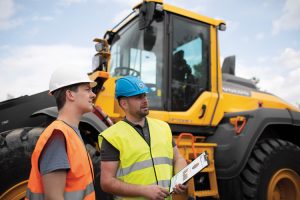Spend enough time working with heavy equipment and you are bound to come across some bad operators. But these four tips can help you put together the best landfill crew possible.
By Eric Yeomans
You know the value a good wheel loader operator brings to your landfill business. Increased productivity, less unnecessary wear on your equipment, reliability and more. So how do you find the best operators?
It starts with the hiring process. You do not want to end up with operators who run the machine at full throttle all the time, do not follow maintenance procedures, ride the brakes and spin the tires, among many other bad habits. In waste and recycling—and really any application—these operators can quickly wear out your wheel loader and cost you money. Worse, they can be a major safety hazard for your crew.
In my experience, these four tips for evaluating wheel loader operator applicants can help you put the best possible people in your machines. You can also use these to assess your current operators.

Photo courtesy of Volvo Construction
Equipment.
#1: Watch the Walkaround
What the operator does before even entering the cab will tell you a lot about how he or she will maintain your wheel loader. Have the applicant do a full walkaround inspection, checking everything from tire inflation pressures and greasing the bucket pins, to checking for leaks, to fluid and fuel levels. Are they looking at everything that they should be before operation?
#2: Pay Attention to the Entry and Prep
Slips and falls entering and exiting the wheel loader cab are a common worksite injury I have observed. These kinds of falls are dangerous mistakes and can result in expensive workers’ compensation claims. Make sure the applicant maintains three points of contact entering and exiting the equipment and faces the cab when using the ladder. Once in the cab, see if he or she adjusts the seat and mirrors and surveys the area around the wheel loader. Failure to recognize hazards in their surroundings is another common cause of accidents.
#3: Check for Smooth Operating
If you can, put your applicants through a real-life test. Have them run through a short cycle loading, and time each applicant and measure their fuel consumption for comparison. A skilled operator will quickly and effectively fill the entire loader bucket and cycle through the load and dump cycle in a series of fluid motions, while conserving fuel.
If you do not have the time or resources to test all of your applicants in real equipment, I have found that simulator programs are a good assessment of operator skill. Simulator training can often be conducted by an equipment manufacturer or a technical school with a relevant operator training program.
#4: Look for Applicants with Manufacturer Training
Some manufacturers offer training programs, which I think can solve a lot of your typical operator problems. Participants are trained and tested to ensure they know how to safely operate and maintain machines. Other types of training programs can offer advanced training for experienced operators, such as teaching enrollees best practices for improving productivity and reducing fuel consumption.
Spend enough time working with heavy equipment and you are bound to come across some bad operators. I know I certainly have. But these four tips can help you put together the best landfill crew you can. | WA
Eric Yeomans is Product Manager, Wheel Loaders at Volvo Construction Equipment (Shippensburg, PA). He has spent more than 40 years with Volvo, dating back to 1977 where he began his career at a Volvo CE dealership. Eric has worked in a variety of roles at Volvo including customer support management, telematics management and product management positions. He can be reached at e[email protected].
